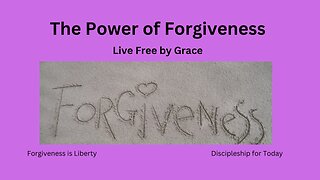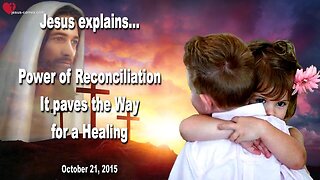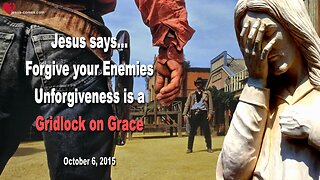Philemon - the Power of Forgiveness
Philemon has a message for us today, for relationships under pressure.
Paul writes from Rome to Philemon, his dearly beloved and fellow labourer. The name, Philemon, means one who loves. Paul tells Philemon, I'm praying for you. He acknowledges his love and faith towards the Lord Jesus and towards God’s people.
Paul notes the communication of his faith – koinonia – it also means fellowship or communion. Paul recognises his faith centered fellowship. Philemon was one who had refreshed the hearts (literally bowels) of his fellow brethren. His heart was for the heart of others – a heart of compassion. He wanted to bless others and see them refreshed and revived in their heart and in their walk with God.
Paul urges Philemon, with the godly principle of love, about his servant, Onesimus. Onesimus had wronged Philemon, and run away from his responsibilities. Paul had met the man, who was now converted, a fellow believer in Christ.
Paul exhorts Philemon about Onesimus, saying him who was become unprofitable is now profitable. The name, Onesimus, means profitable or useful. Paul urges Philemon that Onesimus is another brother in Christ now, by faith. He exhorts him to receive him in brotherly fellowship
Paul sends Onesimus back to Philemon, bearing this letter. He says, receive him, forgive him. The principle here is not to leave something like this unresolved. Paul wanted Philemon to resolve this broken relationship with grace.
Paul could have selfishly kept Onesimus back in Rome as a helper in the gospel ministry but he wanted Philemon to have that opportunity to make things right.
The letter to Philemon is about the power of forgiveness to overcome brokenness, and to bring reconciliation and restoration. God is able to heal and restore that which is broken.
We can see the power of faith, the power of fellowship and the power of forgiveness.
Paul asks Philemon to choose to forgive him and welcome him back - now as his brother in Christ.
We can think of people in our lives who have wronged us and hurt us. It can be hard to forgive, but that is the right thing to do. Extend forgiveness. Don’t stay in unforgiveness. Do the gracious thing. Do the Christ-like thing.
Think of the love and grace, and reconciliation of God towards us. That He should forgive such as we, who really have no deserving of it! God so loved us, even while we were yet enemies.
Forgiveness is not always easy. It can be costly to forgive someone who has wronged us. But the cost of forgiveness is always worth it.
Let go of resentment and bitterness. Don’t hold on to unforgiveness. There’s healing in forgiveness.
Onesimus was a changed man through his encounter with Christ. Christ's redemptive work can restore relationships. It can bring healing, where there once was brokenness.
Christ our redeemer can take that which is broken and damaged by sin - all the broken pieces of our lives - and make us brand new in Christ.
Paul urges Philemon, if you’re in fellowship with me – in communion with me - then here's another brother that we should welcome into that fellowship. There's a special bond - of brotherly fellowship.
Paul tells Philemon how Onesimus is now his brother in Christ. We're brothers together.
The power of faith makes us a community, a fellowship.
Paul writes to the offended, about the offender, as the peacemaker. Paul is in the middle, as a peacemaker - urging reconciliation. That's the heart of God - reconciliation – bringing the offended and the offender together. That's what Christ has done at the cross, as the one mediator between God and man. We're the offender – and He is the offended. Yet He reaches out to us, and by faith we can trust Him and be saved. Christ is The Peacemaker – and reconciliation is made possible because of the cross.
Reconciliation is always worth it. When we reconcile with someone we restore those relationships and we bring healing to both parties. Both parties get a blessing when there's reconciliation. As the peacemaker, Paul says, if there's anything he owes you, charge it to me.
Can we be like Paul, and help promote reconciliation between the offender and those offended?
We have received God's grace because of the cross. We've received God’s great salvation, at no cost to ourselves. In grace He has given us so freely, by the blood of Christ shed for us. We are called to extend grace to others. How can we be like Christ to those who have wronged us? How can we heal the damaged relationships in our own lives? Can we let go of any grudges of the past? Let go of past offenses? Or are we going to hold things against others and stay stewing over them?
Release that burden of unforgiveness. Give it to the Lord. Let go of grudges. Extend grace. It's liberating to let it go.
May we recognise our own brokenness and need for redemption. The love of Christ effects such grace.
We can live out His love and extend forgiveness to our broken world. His grace is sufficient.
-
 21:34
21:34
Discipleship for Today
6 months agoThe Power of Forgiveness
27 -
 11:04
11:04
Shayoli Hope Center For Healing
1 year agoMeditate... Letting Go of Guilt and Moving Into Forgiveness
50 -
 9:31
9:31
News from Jesus
1 year agoOct 21, 2015 ❤️ Jesus explains the Power of Reconciliation… It paves the Way for a Healing
36 -
 0:24
0:24
HowToBeHealedTV with Christian Diggs
7 months agoHealing Scriptures Concepts 29 📖 Mark 11:25-26 ✝️ Forgive Or You Wont Be Forgiven🙏#healingverses
125 -
 37:20
37:20
CatholicReboot
1 month agoEpisode 2025: The Power of Confession and Scripture: Finding Mercy and Strength
199 -
 9:06
9:06
StillSmallVoice
2 years agoPower In Reconcilliation
66 -
 56:41
56:41
Battle4Freedom
2 months agoBattle of the Grudge - Factors of Forgiveness
68 -
 19:13
19:13
GodsPlanYourPart
7 months agoMatthew 8:1-13, Luke 7 | The Power of Faith and Forgiveness
32 -
 58:24
58:24
JonKUhlerLPC
7 months agoGod's heart is for those being harmed and for those willing to protect them. (Pt. 19 on Forgiveness)
49 -
 10:50
10:50
News from Jesus
1 year agoOct 6, 2015 ❤️ Jesus says... Unforgiveness is a Gridlock on Grace, forgive your Enemies!
83